Fort Walton Beach, FL
428 Mary Esther Cut Off NW Unit A,
Fort Walton Beach, FL
32548, United States
(850) 374-3595
Learn when to visit a dermatologist vs. an esthetician for your skincare needs. Understand the differences between these professionals to make an informed decision for your skin's health.
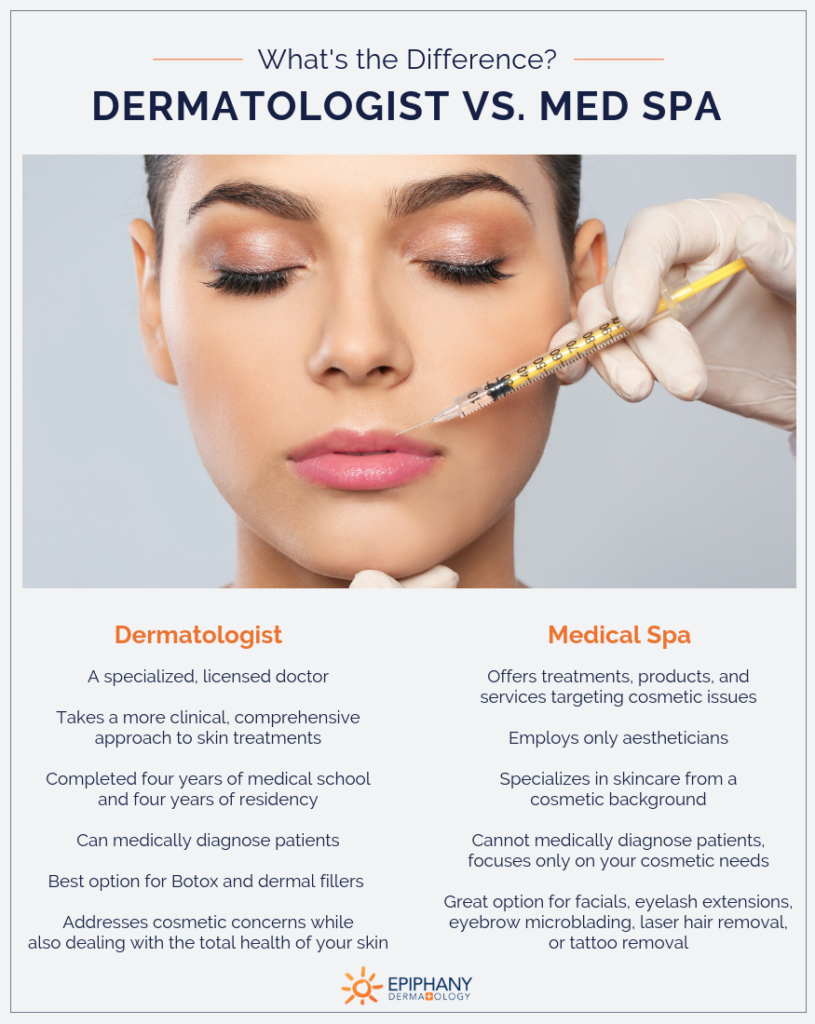
Are you unsure about whether to visit a dermatologist or an esthetician for your skincare needs? It’s a common dilemma, but fear not, because we’re here to help you make the right decision. With so many options and services available, it can be overwhelming to determine who can provide the best care for your skin. In this article, we’ll explore the key factors that can help you discern when it’s time to seek the expertise of a dermatologist versus an esthetician. By understanding the differences between these two professionals, you’ll be equipped to make an informed choice that will benefit the health and appearance of your skin.
When it comes to skincare, there are several common skin concerns that many people face. These concerns can range from mild to severe and may require different levels of expertise and treatment. Some of the most common skin concerns include acne, rosacea, eczema, and psoriasis.
Acne is a skin condition that affects many people, especially during adolescence. It is characterized by the presence of pimples, blackheads, whiteheads, and sometimes cysts on the face, chest, and back. Acne can be caused by hormonal changes, excess oil production, bacteria, or clogged pores. While mild cases of acne can often be treated with over-the-counter products, severe or persistent acne may require the assistance of a dermatologist.
Rosacea is a chronic skin condition that primarily affects the face. It is characterized by redness, flushing, visible blood vessels, and sometimes bumps or pimples. Rosacea can be triggered by various factors, such as sun exposure, spicy foods, alcohol, or stress. While there is no cure for rosacea, there are treatments available that can help manage the symptoms. In some cases, a dermatologist may recommend prescription creams, oral medications, or laser therapy to alleviate the redness and inflammation associated with rosacea.
Eczema, also known as atopic dermatitis, is a chronic condition that causes inflammation of the skin. It is characterized by red, itchy, and sometimes scaly patches that can appear anywhere on the body. Eczema can be triggered by a variety of factors, including certain foods, allergens, stress, or irritants. Treatment for eczema often involves a combination of topical creams, moisturizers, and lifestyle modifications. In some cases, a dermatologist may prescribe stronger medications or recommend allergy testing to identify potential triggers.
Psoriasis is a chronic autoimmune condition that causes the rapid buildup of skin cells. It is characterized by thick, red, and scaly patches that can be itchy and painful. Psoriasis can occur anywhere on the body, including the scalp, elbows, knees, and nails. While there is no cure for psoriasis, there are treatment options available to help manage the symptoms. This may include topical medications, oral medications, light therapy, or biologic drugs. A dermatologist can provide a proper diagnosis and create a personalized treatment plan for individuals with psoriasis.
When considering skincare treatment options, it’s important to understand the differences in education and training between dermatologists and estheticians.
Dermatologists are medical doctors who specialize in diagnosing and treating conditions related to the skin, hair, and nails. They undergo extensive education and training, which includes completing a bachelor’s degree, attending medical school, and completing a residency program focused on dermatology. During their residency, dermatologists gain hands-on experience in diagnosing and treating various skin conditions, including performing procedures and surgeries.
Estheticians, on the other hand, are skincare professionals who focus primarily on cosmetic skincare treatments. They can provide facials, perform skincare procedures, and offer product recommendations. Estheticians must complete a certification program, which typically involves both classroom instruction and hands-on training. While estheticians are knowledgeable in skincare techniques, they do not have the same level of medical training as dermatologists.
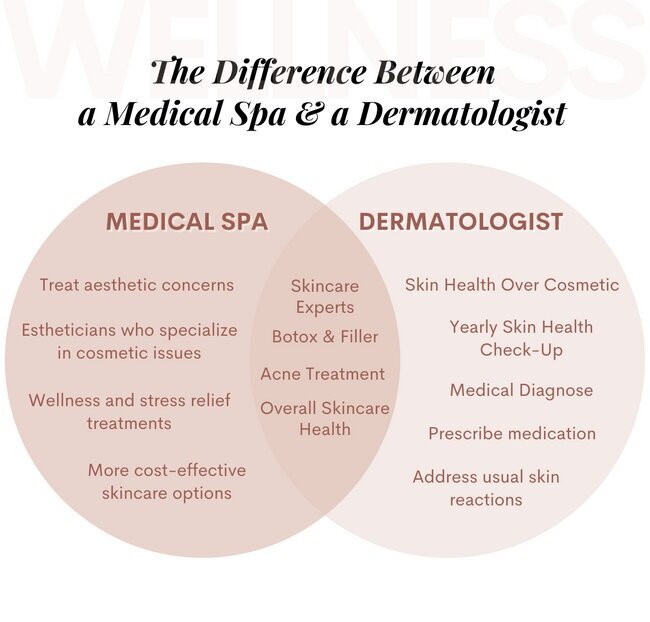
This image is property of images.squarespace-cdn.com.
While both dermatologists and estheticians can provide skincare services, there are specific situations where it is important to consult with a dermatologist.
If you have any suspicions or concerns about potential skin cancer, it is crucial to see a dermatologist as soon as possible. Dermatologists are trained to identify and diagnose skin cancer and can perform biopsies or other necessary procedures to determine if further treatment is required.
If you are struggling with severe or persistent acne that is not improving with over-the-counter products, it may be time to seek the expertise of a dermatologist. They can evaluate your condition, determine the underlying causes, and prescribe appropriate medications or treatments to help manage your acne effectively.
If you have persistent skin issues such as chronic eczema, psoriasis, or rosacea, a dermatologist can provide the necessary expertise to help manage and treat these conditions. They can prescribe stronger medications, recommend lifestyle modifications, and monitor your progress to ensure the most effective treatment plan.
If you have a skin issue that appears to be infected, such as a red, swollen, or painful wound, it is important to see a dermatologist. They can assess the situation, determine if antibiotics or other treatments are needed, and prevent any potential complications.
While dermatologists are best suited for diagnosing and treating medical skin conditions, estheticians can play a valuable role in skincare maintenance and certain aesthetic treatments.
For individuals with mild acne, an esthetician can provide beneficial treatments such as professional extractions, facial massages, and recommendations for appropriate skincare products. Estheticians can help improve the appearance of mild acne and provide guidance for at-home skincare routines.
Estheticians can offer regular skincare maintenance services such as facials, deep cleansing treatments, and exfoliations. These treatments help keep the skin healthy, glowing, and free from impurities.
If you are looking to improve the overall tone and texture of your skin, an esthetician can provide treatments such as chemical peels, microdermabrasion, or laser therapy. These procedures can help reduce fine lines, wrinkles, and uneven skin pigmentation.
Estheticians are skilled in providing various facial treatments that can address specific concerns such as hydration, anti-aging, or reducing redness. These treatments can be beneficial in rejuvenating the skin and promoting a healthier complexion.
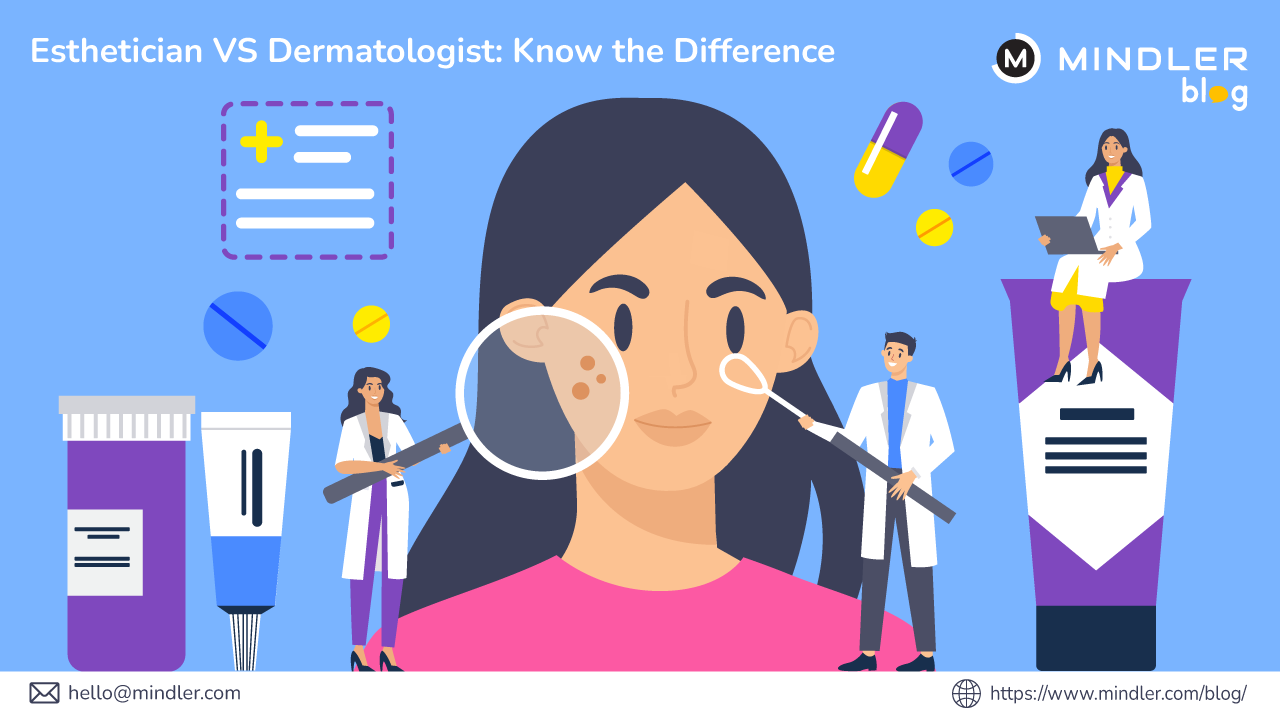
This image is property of s3-ap-south-1.amazonaws.com.
When considering whether to see a dermatologist or an esthetician, it is important to assess your treatment goals and the specific nature of your skin concerns.
If your primary concern is a medical condition, such as skin cancer, severe acne, or chronic skin issues, a dermatologist is the appropriate choice. Dermatologists have the expertise and training to diagnose and treat these conditions effectively.
If your primary focus is on improving the aesthetic appearance of your skin, such as reducing fine lines, improving skin texture, or maintaining overall skin health, an esthetician can provide helpful treatments and recommendations. They can assist in enhancing the aesthetic features of your skin and helping you achieve your desired results.
The cost of skincare services can vary depending on several factors, including the specific treatment, provider, location, and individual insurance coverage.
Dermatologist consultations and procedures are often covered by medical insurance, especially when they are considered medically necessary. However, it is important to check with your insurance provider to understand what services are covered and what expenses you may be responsible for. In cases where insurance coverage is not available, out-of-pocket costs for dermatologist visits and procedures can vary.
Esthetician services are typically not covered by medical insurance since they are considered cosmetic in nature. The cost of esthetician services can vary depending on the specific treatment, location, and the expertise of the esthetician. It is important to inquire about pricing before scheduling any services to ensure you are aware of the associated costs.
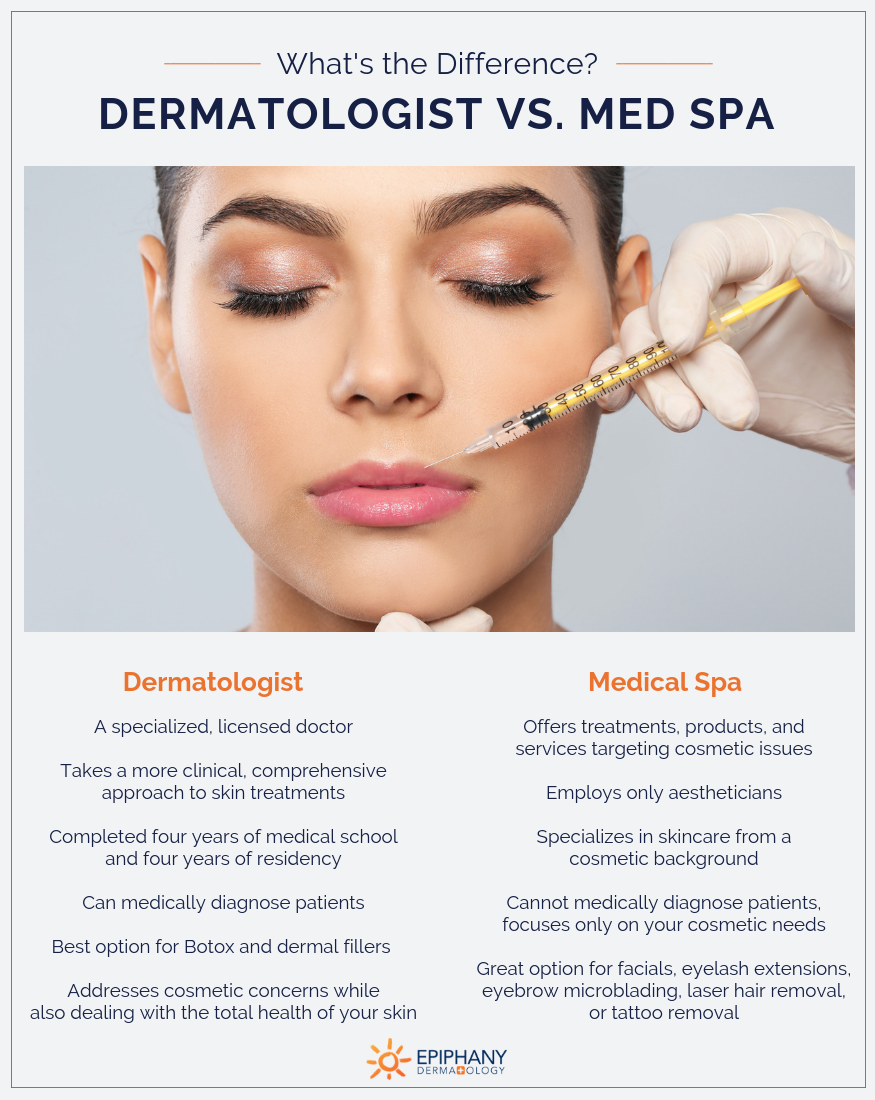
This image is property of www.epiphanydermatology.com.
Insurance coverage for skincare services can vary depending on the nature of the service and individual insurance plans.
In general, dermatologist consultations for medical concerns are often covered by medical insurance. However, it is essential to understand your specific insurance policy and coverage limits. Some insurance plans may require a referral from a primary care physician before seeing a dermatologist, so it is important to be aware of any necessary steps or requirements.
Esthetician services are typically considered cosmetic and therefore not covered by medical insurance. However, it is always a good idea to check with your insurance provider to see if they offer any coverage for esthetician services or if there are any exceptions for specific treatments.
Regardless of whether you consult with a dermatologist or an esthetician, building and maintaining a proper skincare routine is crucial for healthy skin.
Both dermatologists and estheticians can provide valuable recommendations for skincare products, routines, and treatments based on your specific skin concerns and goals. It is important to follow their guidance and incorporate their recommendations into your daily skincare routine.
In addition to professional skincare treatments, it is essential to have a consistent at-home skincare routine. This includes cleansing, moisturizing, using sunscreen, and incorporating any prescribed or recommended products from your dermatologist or esthetician. Consistency and choosing the right products for your skin type can help maintain and improve the overall health of your skin.
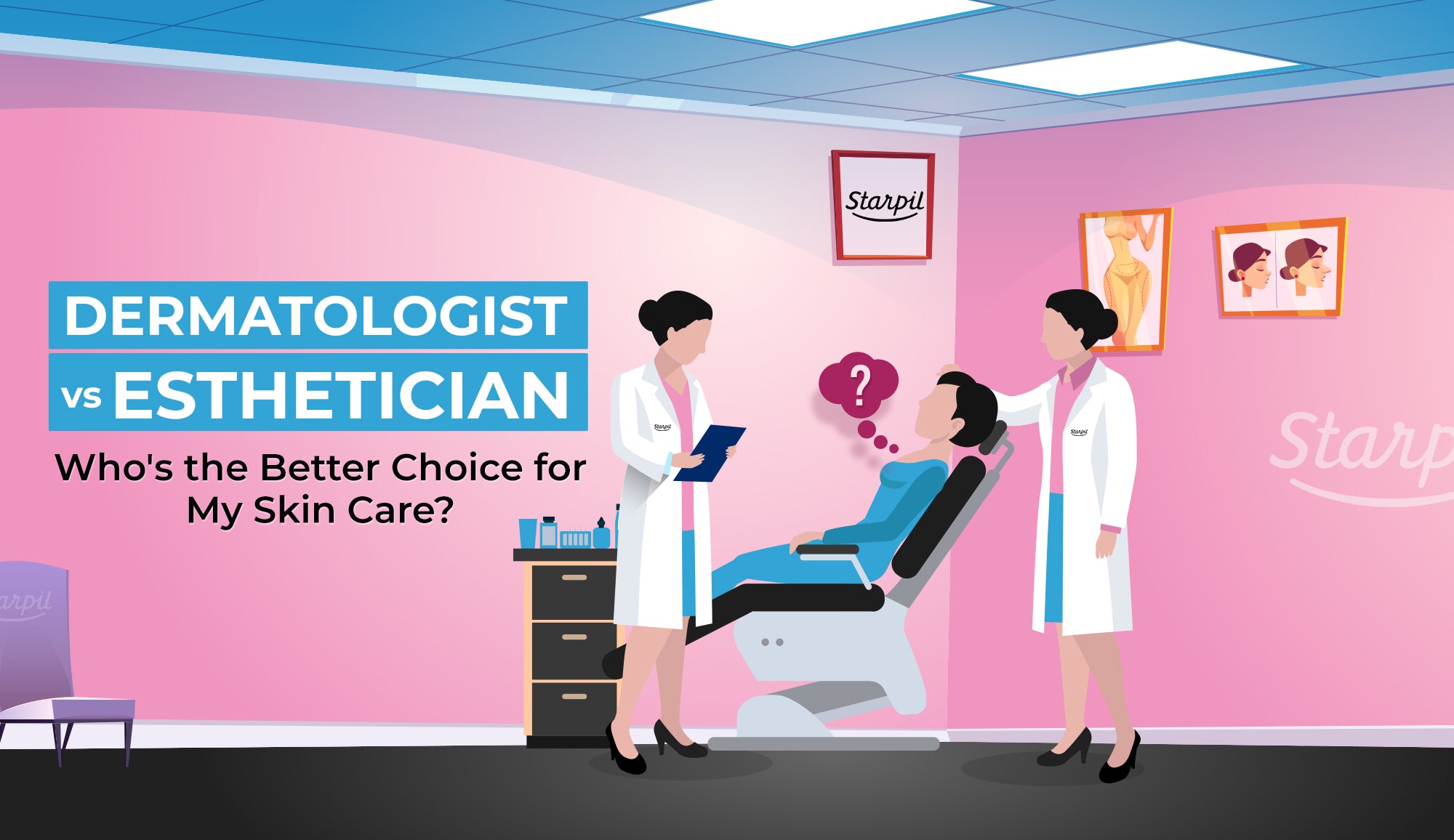
This image is property of cdn.shopify.com.
Dermatologists and estheticians can work together to provide optimal skincare results for individuals with various skin concerns.
When appropriate, a dermatologist and an esthetician can collaborate to develop a comprehensive treatment plan for individuals with complex or multifaceted skin concerns. This collaboration allows for a holistic approach to skincare, combining medical expertise with aesthetic treatments and recommendations.
If you are seeing both a dermatologist and an esthetician, it is essential to communicate any treatments, products, or concerns between the two providers. This allows for a coordinated approach and ensures that all aspects of your skincare routine are taken into consideration.
Understanding when to see a dermatologist versus an esthetician is essential for maintaining the health and appearance of your skin. Dermatologists are the primary point of contact for medical skin concerns and can provide expertise in diagnosing and treating various skin conditions. Estheticians, on the other hand, focus on cosmetic skincare treatments and maintenance. By working together and considering your specific needs and goals, dermatologists and estheticians can help you achieve and maintain healthy, radiant skin. Remember to consult with a skincare professional to determine the best course of action for your individual skin concerns.